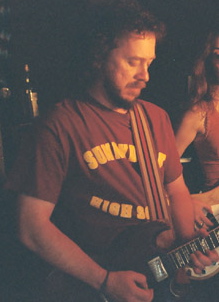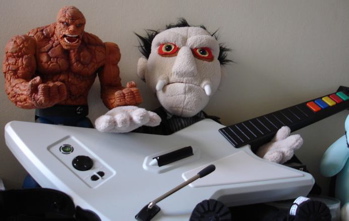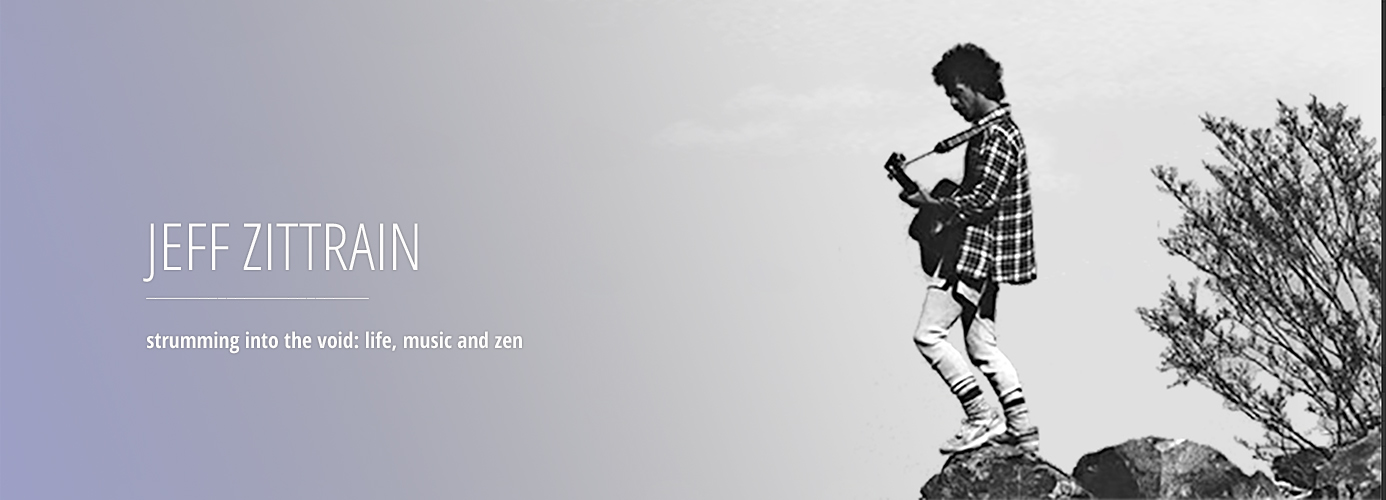(first published in Kynd Music, Oct 2005)
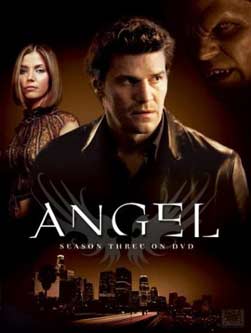
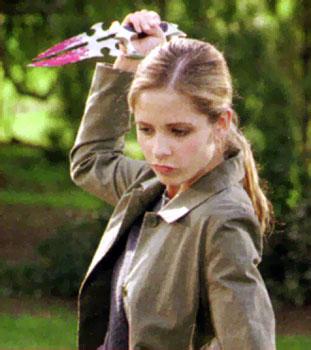
For the past few months I’ve been working my way through the complete DVD collection of the “Buffy the Vampire Slayer” spin-off “Angel.” (Yes, this will have relevance to this column.) There’s a scene in the 4th season where a character remarks after waking up from a particularly trippy magic spell : “ That was quite a whammy – a little trip through the transitive nightfall of diamonds, if you know what I mean…”
The coolness of directly quoting the Grateful Dead’s “Dark Star” and not a more mainstream recognizable hit like “Truckin’” or “Casey Jones”, while not even identifying who they’re quoting is striking. To me it is evidence of the show’s entirely non-posing psychedelic understanding.
Which leads me to a point I’ve wanted to make for a long time – Buffy and Angel are two of the best depictions of the psychedelic experience I’ve ever seen. They come from the inside, from beneath the external parts of a trip. I’ve generally been disappointed by the psychedelic trips in movies, even ones that come from people who are not posing and know from what they speak. For instance, “Easy Rider”, or Oliver Stone movies, or even “Fear And Loathing in Las Vegas” are okay, but they tend to stay with the visuals – it’s like they’re overwhelmed by the experience, and don’t get at the meanings behind it. Most of the time, it certainly doesn’t seem like the characters are enjoying themselves or learning anything.
What strikes me about the Buffyverse, as it is called, however, is that, aside from the visual surrealism of monsters and demons arising out of normal life, is its deeper philosophical surrealism. And its psychedelic quality arises from its intense awareness of itself. It is a perfect irony – vampire shows about self-reflection.
In that same “Angel” episode a character directly address the camera after a commercial break and disparages the commercials we’ve just seen – in the dvd commentary show creator Joss Whedon calls this “breaking the 4th wall”. Usually used in reference to works of fiction, this is also the wall that gets broken down by psychedelics. (If you want to relate it to the wall of personal defenses that Pink Floyd tore down in 1980, see this September column…). It reminds me of the old Dead t-shirt of Jerry Garcia peeping over his glasses from the picture on a box of Corn Flakes. Jerry pulling down his glasses seems to me to be saying: we’re all here behind the masks, somewhere. We’re only manifesting in these earthly bodies as an illusion. Wake up – to find out that you are the eyes of the world. And, incidentally, you can get shown the light while you’re eating your cereal.
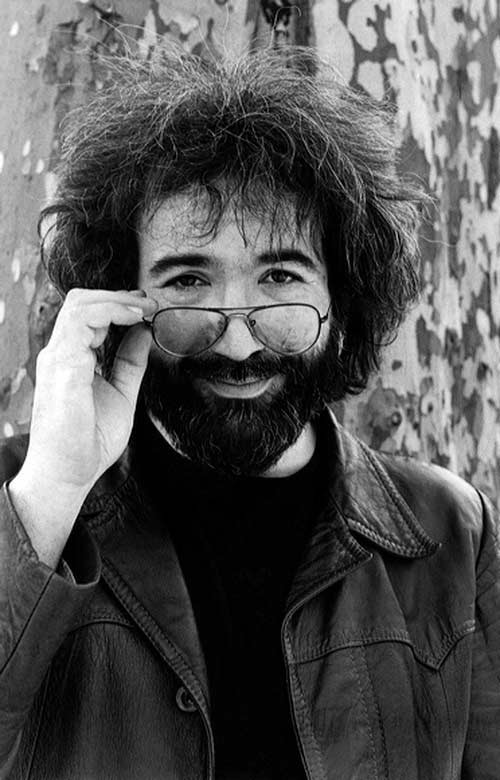
It’s all a play. All the world’s a stage, as a famous English playwrite once remarked. The Buffyverse is constantly playing with that idea, having the characters comment on their own story and the traditional horror, myth, action-movie, and pop culture stories from which they take their cues. Buffy’s friends call themselves “The Scooby Gang” and occasionally refer to themselves as “sidekicks.” “What are you, the narrator?” a character says when someone explains what just happened. “Are we gonna fight or are we gonna be ironic?” a vampire asks when Buffy engages in action-movie quips. Like Richard III announcing his villainous role in the beginning of that play, “we are villains…” the geeks against Buffy proclaim, “…we are your nemesis –es- es…” they stumble, unable to pronounce the plural. (Which is funny, but, as we find out, doesn’t take away from their very real danger).
This combination of understanding, appreciating, and utilizing traditional forms, and yet blending these genres and defying expectations, reminds me again of the Dead. The Buffyverse moves from horror to comedy to drama to philosophy, and generally pulls off every one of them with skill and homage to its tradition – just as the Dead move from blues to folk to rock to country to jazz to avant-garde classical, and generally pull them off as well. Sometimes they do it from song to song and sometimes within the same song – just as Buffy can blend it all in the same scene or image.
But moving furthur, getting to the trippier level, they reflect not just on the forms from which they come, but on themselves. One scene from Buffy that seems most psychedelic to me, has no spell and no trippy visuals at all: Buffy explains to her returning father-figure Giles all the epically horrible things that have happened to her through the entire season; there’s a beat as Giles and we the audience absorb the intense recap – and then Giles and Buffy burst out laughing, doubled over, unable to stop.
It’s this sense of the absurdity of our roles in life, and at the same time the fact that we still have to play them, and still have to experience the emotions and reality of them, that becomes quite profound. (It’s the Sophoclean irony of “Oedipus the King”, but with that psychedelic impact – we get the larger perspective of the gods looking at the puny humans, but it’s side-splittingly pee-in-your-pants funny somehow, not just sort of amusing in a detached, superior way).
For there’s both – for all their humor, Buffy and Angel are not all detached irony and self-deflation – they’re not afraid to take themselves seriously, to be profound. This is why they can pull off the genre mixing and why it adds up to something – they’re not just mixing and matching with some snide post-modern sense of superiority. Like the Dead, who with all their whimsy and good nature, are also not afraid to reach for their soul. (Unlike, say, Frank Zappa, who could bend and mix genres on a dime, and with lots of yucks, but never play a traditional song straight-up). Buffy’s geeks can’t pronounce “nemeses” and they are genuinely ridiculous – but they cause heartbreaking damage nonetheless. Just like in the real world. Beyond all the illusions and posturing, the world is run by real people – fallible, flawed, silly, heroic, and dangerous.
I’m not sure where it all ends. (I’m almost through Angel season 4 and have one season left – so I’d appreciate anyone writing in to not give away anything that I haven’t seen yet). There’s certainly a sense of the yin-yang in the shows – Angel is a vampire with a soul, the epitome of a bizarre composite of opposites, and the struggle between good and evil in the Buffyverse seems at times very Manichean black/white and at other times very interdependent.
The Dead seem to land at a peaceful transcendence – they find “good” – Help is on the Way… wake up to find out… Through all the craziness, the screamin’ heebie jeebies of the acid trip lead them to the peaceful mystic waters downstream. Their concerts didn’t end in the middle of set two with “Space” and the dark night of the soul – inevitably they came back and rocked on, completing the hero’s journey.
Angel and Buffy, however, for everything else they are, and for all their mysticism, are at their heart horror shows. More often than resolution is fear, danger and tragedy. But they swing the horror towards myth, which despite all its death and danger, can still find redemption and resolution.
And what does this have to do with “Right Action”? Perhaps the vampire is evil because he has no reflection – he can’t look at himself. The intense self-referentiality of the Buffyverse shows an understanding that life is quite absurd from that larger perspective, and they forge a willingness to continually challenge and deflate their own pretensions while still not demeaning true experience – life is in fact richer. We can only act right when we can truly look at ourselves.
(And maybe this will go some way in explaining why I’m wearing a “Sunnydale High School” t-shirt on the back cover of our first cd…)
